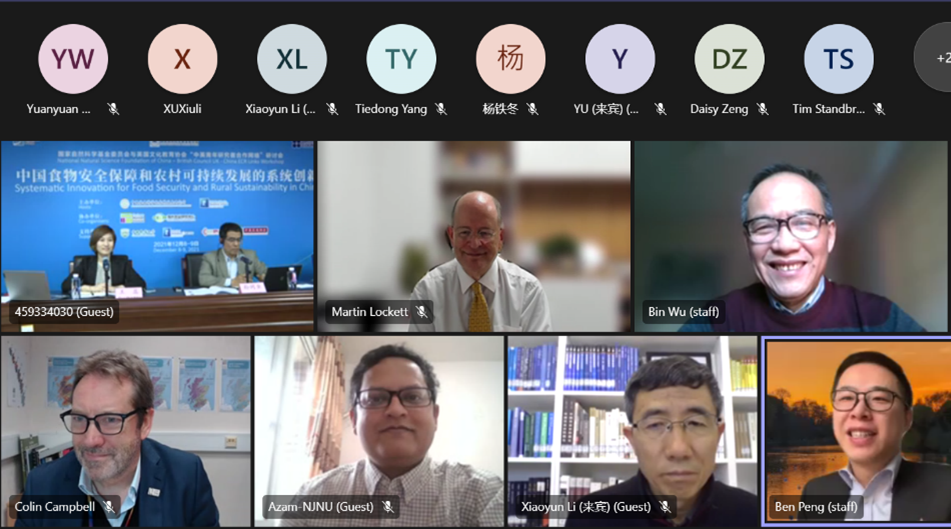
December 16, 2021, by aczjb1
Methodological exploration of food and rural studies in the global south: A reflection on the UK-China ECR Links Workshop December 2021
Dr Bin Wu reflects on the recent UK-China online workshop for early-career researchers hosted by the University of Nottingham and Chinese Academy of Social Sciences.
For food system transition and rural sustainability studies in the global south, a common dilemma facing early career researchers (ECRs) is a lack of experience, opportunity and channels to develop interdisciplinary communication and stakeholder-engaged research. These are needed in order to understand the complexity of the problems and to offer local solutions. To address this challenge, a UK-China ECR Links workshop was successfully held online, on the 8 and-9 December 2021. The theme of the event was: Systematic Innovation for Food Security and Rural Sustainability in China.
A total of 41 ECRs from 30 research institutions from the UK and China working across natural and social science boundaries gathered to establish a platform for research collaboration across disciplinary, industrial and country boundaries in food and rural studies. One of the questions posed was: given the interruption and so many uncertainties caused by the global pandemic, how can these ECRs be mobilised and organised to develop common interests for long term collaboration?
A key factor attracting ECRs from the two countries was a mentoring team comprised of more than 20 internationally renowned scholars and industrial leaders including: Professor Shenggen Fan and Professor Xiaoyun Li from China Agricultural University, Dr Jonathan Snape, Head of James Hutton Ltd and Dr Yan Shi, Founder and Chair of China CSA (community-support agriculture) Network. The team provided a sound base for ECRs to develop a systematic innovation perspective, referring to a process of developing new approaches, understanding, and skills for communication and collaboration across disciplinary, industrial, social and cultural boundaries towards the interconnection and co-development of technological, social and institutional (or policy) innovations. Systematic innovation is particularly important to address global challenges such as climate change, poverty alleviation, food security, and other issues facing most vulnerable communities in the global south.
To develop common interests and collaborative networks, three rounds of online meetings were arranged for the registered ECRs in October and November 2021.There were also:
- seven group meetings with mentors organised by research themes (e.g. agroecology, digital agriculture, potato industrialisation, ecological agriculture, rural social innovation, food system transition)
- three methodological salons (challenge-oriented research design, citizen science for food transition studies, preparing high quality papers in global south)
- three roundtable meeting with stakeholders (UK-China rural tourism, potato innovation base, and smart farm).
Based upon the above preparation, this workshop aimed to facilitate academic exchange along the lines of challenge-oriented and systematic perspective researches for food security and rural sustainability in China. It also aimed to share research findings, methodological innovation and resources for interdisciplinary research collaboration among ECRs between UK and China and to identify opportunities and pathways for research and innovation collaboration between ECRs and industrial stakeholders in agriculture and rural development.
This project was jointly funded by the Newton Fund and National Science Foundation of China, and hosted by Nottingham University Business School and Rural Development Institute of the Chinese Academy of Social Sciences with the support from James Hutton Institute (JHI), Chinese Academy of Agricultural Sciences, China Agricultural University, and University of Nottingham Ningbo China (UNNC).The event attracted over 150 attendees, including registered ECRs and young researchers (including students at doctoral and postgraduate levels) from China and the UK. The distinguished guests expressed their congratulations and support for ECRs to develop bilateral research and innovation collaboration. They included: Professor Patrick Chau, Vice-Provost from UNNC; Professor Houkai Wei, Director of Rural Development Institute of CASS; Professor Zoe Wilson, Pro-Vice Chancellor for Faculty of Science, University of Nottingham; Mr Tim Standbrook, Deputy Consul General, British Consulate General Chongqing; Professor Colin Campbell, CEO of James Hutton Institute.
The two-day Workshop comprised seven keynote speeches, 10 ECR representations, six ECR group reports, and two roundtable discussions. Special thanks are given to highly inspired keynote speeches including: China’s strategy on food security (Professor Houkai Wei of CASS), Global food system in transition: Challenges & research opportunities for ECRs (Professor Shenggen Fan of CAU); Future Food Beacon across disciplinary and campus boundaries (Professor David Salt of University of Nottingham).
The following key messages can be summarised and drawn from this event:
- Challenge oriented research is imperative for ECRs to not only address global challenges directly, but also better understand and promote good practices in China and the global south effectively.
- Interdisciplinary research collaboration is vital to connect natural, economic, social systems to gain a big picture and in-depth understanding on the complexity facing local communities.
- Stakeholder engaged research is important to bring local knowledge into the knowledge innovation system to cope with local challenges and offer innovative solutions.
- Institutional partnerships between the University of Nottingham and participatory institutions have been enhanced to support ECR consortium for jointly research design, funding application, and leading to high quality publications and social impacts.
With a perspective to long term research collaboration and partnership building between ECRs and industrial stakeholders, an online questionnaire survey is carried out to understand the needs, resources and opportunities for ECRs to contribute to UK-China agricultural/rural innovation collaboration. It is suitable to those research institutions/centres and organisations (government agencies, agribusiness companies, investment and trade, cooperatives and farmer’s associations) who have experience or interests to involve bilateral collaboration. We would highly appreciate it if you could participate, support or disseminate this survey to those which may be interested to contribute.
Please click here to take part.
No comments yet, fill out a comment to be the first

Leave a Reply